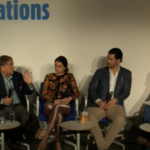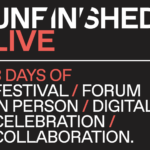
Author Archives for AndrasAdmin


2021 BMW Art Journey Shortlist Announced
Leave your thoughts <p>During this year’s Art Basel in Hong Kong, Art Basel and BMW announced the 2021 shortlist for the BMW Art Journey. The artists include French-Caribbean artist Julien Creuzet, Korean cinematographer Kelvin Kyung Kun Park, and Chinese artist Alice Wang. Launched in 2015, this is the 10th edition of the BMW Art Journey, which sends artists on journeys of creative discovery all over the world. Like a mobile studio, the BMW Art Journey can take artists almost anywhere in the world to develop new ideas and envision new creative projects.</p>
Panel “The Future of the Museum:28 Dialogues” organized by ICOM Israel
Leave your thoughts <p>Listen to a talk on the future of museums in honor of the launch of András Szántó’s book.</p>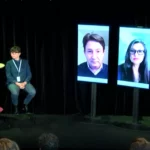
ACMI on The Future of Museums
Leave your thoughts <p>As part of the 2021 Melbourne Art Book Fair, András Szántó, Rhana Devenport, Suhanya Raffel, Katrina Sedgwick reflected on the unforeseen events of 2020 and discussed the challenges and opportunities facing the future of museums. </p>
GCDN Conversations: So what have we learned in the last year?
Leave your thoughts <p>The pandemic has hit the cultural sector in different cities in diverse ways, but there is a certain homogeneity in the stated aspirations of the cultural sector as it emerges from the crisis: develop deeper relationships with the immediate community and become an indispensable social hub. Panel | 2021 |</p>
Conversation with Adam Levine and Andras Szanto
Leave your thoughts <p>Andras Szanto’s book, The Future of the Museum: 28 Dialogues, surveys the emerging landscape of museum practices through conversations with museum directors in fourteen countries on six continents, including Adam Levine, the Director of the Toledo Museum of Art. The picture that emerges is a museum field in transition as museums reassess their ties with audiences and communities, retool their physical and organizational structures, reckon with deep-seated cultural and political currents, and adapt to accelerating technological change. But what does this all mean for the Toledo Museum of Art and how can the TMA contribute to the evolution museums?</p>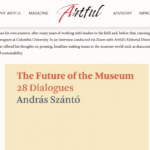
Feature: András Szántó on the Future of Museums
Leave your thoughts <p>András Szántó spoke with Karen Rosenberg of apropos of his new book, The Future of the Museum: 28 Dialogues, for Artful. </p>
András Szántó and Corinne Erni on The Future of the Museum
Leave your thoughts <p>On February 12, Corinne Erni, Senior Curator of the Parrish Art Museum in Water Mill, New York, and museum strategist and author András Szántó will come together in a live-stream conversation to discuss his new book, The Future of the Museum: 28 Dialogues.</p>
Imagining the Museum – Panel Discussion
Leave your thoughts <p>Suhanya Raffel, Koyo Kouoh & Kamini Sawhney in conversation with András Szántó explored the common conditions and diverse contexts that inform their ideas of what defines museums and their future. Panel | 2021</p>
MISK FOUNDATION
Leave your thoughts <p>Strategic Event published Master class in museum strategy and management</p>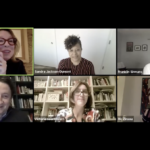
The Brooklyn Museum Virtual Roundtable: The Future of the Museum Dialogues
Leave your thoughts <p>How do museums fit into the calls for social change that echo around the globe today? Learn about some exciting approaches to inventing and reinventing the museum with two back-to-back conversations in conjunction with the U.S. publication of museum strategist András Szántó’s book The Future of the Museum: 28 Dialogues. Szántó will be in conversation with Sandra Jackson-Dumont, director of the Lucas Museum of Narrative Art in Los Angeles andMarie-Cécile Zinsou, President and Founder of Benin’s Zinsou Foundation. Then, get an inside look into how museums are reshaping their institutions as Anne Pasternak speaks with Victoria Noorthoorn of the Museo de Arte Moderno de Buenos Aires and Franklin Sirmans of the Pérez Art Museum Miami.</p>